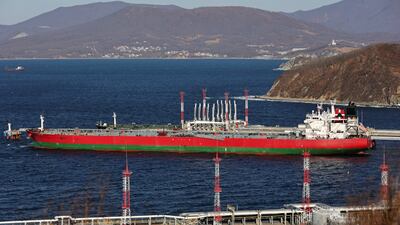Further releases of oil stocks by International Energy Agency member countries are “on the table” in the event of market disruptions, the agency's chief energy economist said on Wednesday.
“In perspective, there are still substantial stocks available to IEA member countries that could be deployed in case of in case of necessity,” Tim Gould told delegates attending the Gulf Intelligence Global UAE Energy Forum, which is being held virtually.
“We will continue to keep a very close eye on market developments and potential disruptions this year.”
Brent crude soared to a near 14-year high of $140 a barrel after Russia’s invasion of Ukraine in February. To stabilise the market, the Paris-based agency allowed two emergency releases in March and April last year.
“That part of the arsenal is still very much intact … some countries will be looking to replenish those stocks as and when it is prudent to do so,” said Mr Gould.
The IEA economist does not rule out another oil price rally in 2023 as some factors could potentially tighten crude markets.
The “reconfiguration” of global trade resulting from an EU ban on Russian oil product imports will be “significantly more complex”, said Mr Gould.
“There are all sorts of tanker and storage issues that would make that very complicated, so we need to be very watchful of how that plays out in February and beyond.”
The IEA expects Russia oil production to fall by 1.4 million barrels per day this year after the EU and the G7 imposed a price cap on Russian crude exports on December 5.
In its latest oil market report, the IEA increased its global oil demand growth estimate for this year on rising crude consumption in India, China and the Middle East.
The agency has forecast an oil demand growth of 1.7 million bpd in 2023, up from its previous estimate of 1.6 million.
“The second half of the year is clearly the one to watch when it when we look for big changes on the demand side or the import side from China,” said Mr Gould.
A fuel demand rebound in China, which recently reopened its borders for the first time in three years, may result in tighter natural gas markets in Europe, he said.
The agency said the EU could fall short by about 27 billion cubic metres of gas this year if Russian gas deliveries drop to zero and China’s LNG imports rebound to 2021 levels.
“You could argue about both of those [scenarios happening], but they are not inconceivable and, under those circumstances, we would see some significant strains again on the European gas balance,” said Mr Gould.
European natural gas prices fell to a more than one-year low last week as milder temperatures led to a drop in demand.
European gas futures hit a record high of about €343 per megawatt hour in August last year after Russia reduced gas deliveries to the continent.
Oil prices steadied on Wednesday after falling nearly 1 per cent in morning trading amid a build-up in US crude stocks and growing fears of a global economic slowdown.
Brent, the benchmark for two thirds of the world’s oil, was 0.66 per cent higher at $80.63 a barrel at 1.23pm UAE time while West Texas Intermediate, the gauge that tracks US crude, was up 0.55 per cent at $75.53 a barrel.
US crude stocks rose by about 15 million barrels in the week that ended on January 6, according to market sources as they cited data from the American Petroleum Institute.
Oil prices inched up on Tuesday after the US Energy Information Administration (EIA) said it expected global consumption of liquid fuels such as petrol, diesel and jet fuel to set a record in 2024.
"I still believe that price pullbacks could be interesting dip-buying opportunities as there are many supportive factors, including the Chinese reopening, and the globally tight supply," Ipek Ozkardeskaya, a senior analyst at Swissquote Bank, said.
Amrita Sen, founder and director of research at Energy Aspects, expects Brent to average $100 a barrel in 2023, driven by a recovery in China, the world's second-largest economy.
"China's reopening is going to be the number one thing driving oil prices this year," Ms Sen told attendees at the Gulf Intelligence Global UAE Energy Forum.
"The upside could be quite substantial, just depending on the timing of it ... China is still grappling with a lot of Covid cases, which has meant that oil demand is yet to pick up quite substantially," said Ms Sen.
"But, we are starting to see some of the green shoots with regards to demand and the jet numbers are picking up [and so is] gasoline [demand]."

